ACETAMINOPHEN/CODEINE - ORAL
PHONETIC PRONUNCIATION: (a-SEET-a-MIN-oh-fen/KOE-deen)
COMMON BRAND NAME(S): Tylenol-Codeine No.3, Tylenol-Codeine No.4, Vopac
GENERIC NAME(S): acetaminophen with codeine phosphate
Uses
USES: See also Warning section. This combination medication is used to help relieve mild to moderate pain. It contains an opioid (narcotic) pain reliever (codeine) and a non-opioid pain reliever (acetaminophen). Codeine works in the brain to change how your body feels and responds to pain. Acetaminophen can also reduce a fever.
How to use ACETAMINOPHEN/CODEINE - ORAL
HOW TO USE: See also Warning section. Read the Medication Guide provided by your pharmacist before you start taking acetaminophen/codeine and each time you get a refill. If you have any questions, ask your doctor or pharmacist. Take this medication by mouth as directed by your doctor. You may take this drug with or without food. If you have nausea, it may help to take this drug with food. Ask your doctor or pharmacist about other ways to decrease nausea (such as lying down for 1 to 2 hours with as little head movement as possible). If you are using a liquid form of this medication, use a medication measuring device to carefully measure the prescribed dose. Do not use a household spoon because you may not get the correct dose. If you are taking the suspension, shake the bottle well before each dose. The dosage is based on your medical condition and response to treatment. Do not increase your dose, take the medication more frequently, or take it for a longer time than prescribed. Properly stop the medication when so directed. Pain medications work best if they are used as the first signs of pain occur. If you wait until the pain has worsened, the medication may not work as well. If you have ongoing pain (such as due to cancer), your doctor may direct you to also take long-acting opioid medications. In that case, this medication might be used for sudden (breakthrough) pain only as needed. Other pain relievers (such as naproxen, ibuprofen) may also be prescribed with this medication. Ask your doctor or pharmacist about using this product safely with other drugs. This medication may cause withdrawal reactions, especially if it has been used regularly for a long time or in high doses. In such cases, withdrawal symptoms (such as restlessness, watering eyes, runny nose, nausea, sweating, muscle aches) may occur if you suddenly stop using this medication. To prevent withdrawal reactions, your doctor may reduce your dose gradually. Ask your doctor or pharmacist for more details, and report any withdrawal reactions right away. When this medication is used for a long time, it may not work as well. Talk with your doctor if this medication stops working well. Though it helps many people, this medication may sometimes cause addiction. This risk may be higher if you have a substance use disorder (such as overuse of or addiction to drugs/alcohol). Take this medication exactly as prescribed to lower the risk of addiction. Ask your doctor or pharmacist for more details. Tell your doctor if your pain persists or worsens.
Side Effects
Precautions
Interactions
Overdose
Images

- color
- orange-yellow
- shape
- imprint
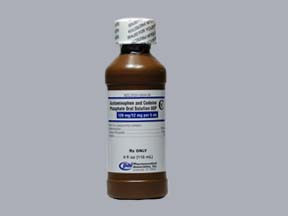
- color
- orange-yellow
- shape
- imprint
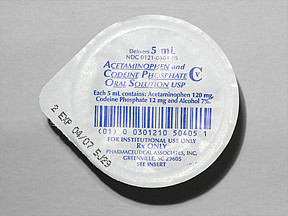
- color
- orange-yellow
- shape
- imprint
Reviews
Faq for ACETAMINOPHEN/CODEINE - ORAL
Acetaminophen/Codeine is a combination medication used to relieve moderate to severe pain.
Acetaminophen provides pain relief by inhibiting the production of certain chemicals in the brain. Codeine works by binding to opioid receptors in the central nervous system, resulting in reduced pain perception.
Common side effects of Acetaminophen/Codeine may include dizziness, drowsiness, constipation, nausea, and vomiting.
No, if you are allergic to codeine, you should not take Acetaminophen/Codeine. It is essential to inform your healthcare provider about any allergies you have before taking this medication.
Yes, Acetaminophen/Codeine contains codeine, which is an opioid medication that can be habit-forming. It should only be used as prescribed and for the shortest duration possible to avoid dependence or addiction.
No, it is not recommended to drink alcohol while taking Acetaminophen/Codeine as it can increase the risk of serious side effects, such as liver damage or respiratory depression.
Acetaminophen/Codeine typically starts working within 30 minutes to an hour after oral administration.
No, Acetaminophen/Codeine may cause drowsiness or dizziness, which can impair your ability to drive or operate machinery. It is advised to avoid such activities until you know how this medication affects you.
It is essential to inform your healthcare provider about all the medications you are taking, including prescription, over-the-counter, and herbal products. Some medications may interact with Acetaminophen/Codeine and can increase the risk of side effects or reduce its effectiveness.
Warning
WARNING: Codeine has a risk for abuse and addiction, which can lead to overdose and death. Codeine may also cause severe, possibly fatal, breathing problems. To lower your risk, your doctor should have you take the smallest dose of codeine that works, and take it for the shortest possible time. See also How to Use section for more information about addiction. The risk for severe breathing problems is higher when you start this medication and after a dose increase, or if you take the wrong dose/strength. Taking this medication with alcohol or other drugs that can cause drowsiness or breathing problems may cause very serious side effects, including death. Also, other medications can affect the removal of codeine from your body, which may affect how codeine works. Be sure you know how to take this medication and what other drugs you should avoid taking with it. See also Drug Interactions section. Get medical help right away if any of these very serious side effects occur: slow/shallow breathing, unusual lightheadedness, severe drowsiness/dizziness, difficulty waking up. Keep this medicine in a safe place to prevent theft, misuse, or abuse. If someone accidentally swallows this drug, get medical help right away. One ingredient in this product is acetaminophen. Taking too much acetaminophen may cause serious (possibly fatal) liver disease. Adults should not take more than 4000 milligrams (4 grams) of acetaminophen a day. People with liver problems and children should take less acetaminophen. Ask your doctor or pharmacist how much acetaminophen is safe to take. Do not use with any other drug containing acetaminophen without asking your doctor or pharmacist first. Acetaminophen is in many nonprescription and prescription medications (such as pain/fever drugs or cough-and-cold products). Check the labels on all your medicines to see if they contain acetaminophen, and ask your pharmacist if you are unsure. Get medical help right away if you take too much acetaminophen (overdose), even if you feel well. Overdose symptoms may include nausea, vomiting, loss of appetite, sweating, stomach/abdominal pain, extreme tiredness, yellowing eyes/skin, and dark urine. Daily alcohol use, especially when combined with acetaminophen, may damage your liver. Avoid alcohol. Before using this medication, women of childbearing age should talk with their doctor(s) about the risks and benefits. Tell your doctor if you are pregnant or if you plan to become pregnant. During pregnancy, this medication should be used only when clearly needed. It may slightly increase the risk of birth defects if used during the first two months of pregnancy. Also, using it for a long time or in high doses near the expected delivery date may harm the unborn baby. To lessen the risk, take the smallest effective dose for the shortest possible time. Babies born to mothers who use this drug for a long time may develop severe (possibly fatal) withdrawal symptoms. Tell the doctor right away if you notice any symptoms in your newborn baby such as crying that doesn't stop, slow/shallow breathing, irritability, shaking, vomiting, diarrhea, poor feeding, or difficulty gaining weight. Children younger than 12 years should not use products that contain codeine. Children between 12 and 18 years old should not use codeine after certain surgeries (including tonsil/adenoid removal). Also, codeine use is not recommended for children between 12 and 18 years old who are obese or have breathing problems. Some children are more sensitive to codeine and have had very serious (rarely fatal) breathing problems such as slow/shallow breathing (see also Side Effects section). Talk with your doctor or pharmacist about the risks and benefits of this medication.
Disclaimer
IMPORTANT: HOW TO USE THIS INFORMATION: This is a summary and does NOT have all possible information about this product. This information does not assure that this product is safe, effective, or appropriate for you. This information is not individual medical advice and does not substitute for the advice of your health care professional. Always ask your health care professional for complete information about this product and your specific health needs.
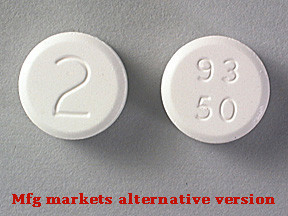
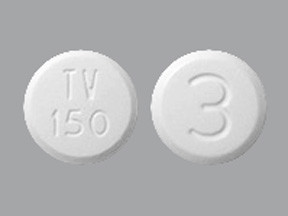
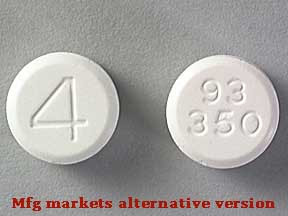
No Reviews Yet